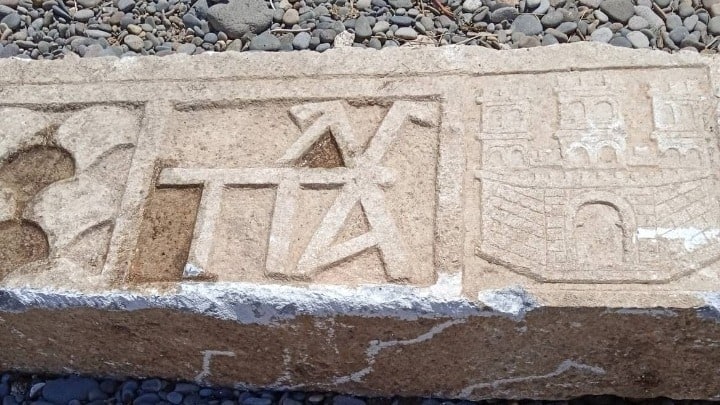A 3.50-metre-long marble lintel found during an excavation near the foundations of the Byzantine gate of the castle of Agioi Theodoroi and linked to the ancient city-state of Antissa, one of the ancient Aeolian city-states of the island of Lesvos, is leading to a revision of the island's late Byzantine history.
According to the Ministry of Culture, the lintel was found during the excavation of the southeastern part of the medieval sea wall of the castle of Agioi Theodoroi, also known as Ovriokastro, next to the Byzantine gate of the castle. It bears in relief the heraldry of the Genoese House of Gattilusio, as well as that of the Palaiologos dynasty, which until today were only known from their equivalents in the medieval castle of Mytilene and indicate the handover of the governance of Lesvos, as well as its castles, from the Byzantines to the Gattilusio dynasty.
The most interesting thing, however, about the lintel of this Byzantine gate is that next to the heraldry of the Palaiologos, instead of the double-headed eagle, a symbol of Byzantium, was found a depiction of a castle with a main gate and three rectangular towers on the acropolis, a depiction which seems to be identified with the then Byzantine castle of Agioi Theodoroi, which was handed over in 1355 AD by the Byzantines to the Gattilusi. It is noted that the written sources and testimonies to date do not preserve any depiction of the Byzantine castle of Aghioi Theodoroi. The marble lintel is the first representation of it and gives evidence of its form, unknown to us until today, as it had undergone substantial reconstruction during the 15th century by the House of Gattilusio.
Stay updated with the latest news from Greece and around the world on greekcitytimes.com.
Contact our newsroom to share your updates, stories, photos, or videos. Follow GCT on Google News and Apple News.


